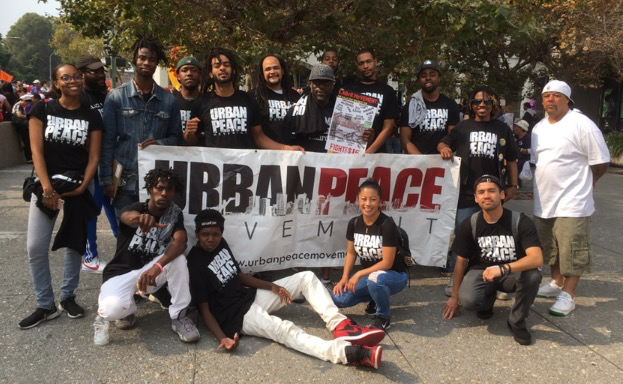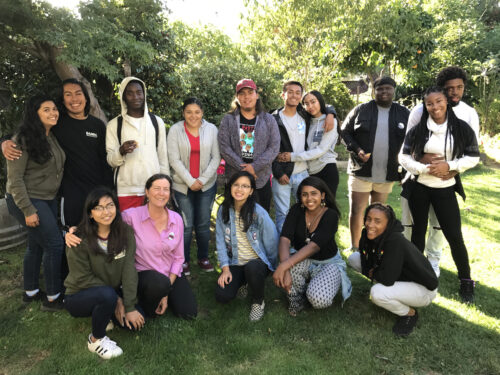|
September Spotlight |
Urban Peace Movement The 16 racial justice organizations that are currently part of Akonadi Foundation’s Arc Toward Justice Fund (ATJ) are building collective power to shape the policies and systems that affect communities of color in Oakland. We at Akonadi lift up the work of our ATJ grantees through our monthly spotlight series; for our September installment, we feature Urban Peace Movement and BAY-Peace. We spoke with Urban Peace Movement’s Prince White and BAY-Peace’s Leilani Salvador-Jones about their organizations’ work in Oakland. Q: What is the vision that guides your work? What will the world – and specifically Oakland – look like if you are successful? A: Urban Peace Movement builds the leadership of youth of color from Oakland and the East Bay Area to transform the cultural and social conditions that lead to community violence and mass incarceration in low-income communities of color. Urban Peace Movement’s model, Healing Centered Youth Organizing, supports young people to feel self-confident and hopeful while empowering them to work for an Oakland and a California that prioritizes healing, racial justice, and social and economic equity. BAY-Peace: We are guided by our belief in the power that youth have to create a more just and equitable society. It is their vision that we put at the forefront of our work and that guides our decision making for involvement with the Oakland movement for racial and social justice. In our work, what is most important is that youth discover their agency to create social change, question systems of oppression, and bring their ideas of personal, community or societal transformation to life. BAY-Peace works with Oakland youth, fostering organizing and creative expression to build more equitable and just systems that support development, empowerment, and safety for youth of color. Q: What current campaigns are you working on? A: Urban Peace Movement is working on a number of justice reinvestment campaigns, which means striving to decrease the amount of money spent on mass incarceration and increase the amount of money spent in the community on opportunities for youth, jobs, and housing – things that create real safety. We are working to close youth prisons, end the treatment of juveniles as adults in the criminal injustice system, and lower the barriers to employment and housing for formerly incarcerated people. We had a big victory this summer in the Justice for DaJon Ford Participatory Defense campaign. We led the charge in a “participatory defense“ case supporting a young man named DaJon Ford, a former high school football star from Oakland who was charged as an adult here in Alameda County for an incident that occurred when he was just 17 years old. On top of that, he was being held at Santa Rita Jail, where he had languished for nearly four years awaiting trial. In June, we formed a community support committee with help from our allies in the Justice Reinvestment Coalition such as CURYJ and Ella Baker Center. The committee launched a campaign to convince the DA’s Office that DaJon should be released or returned to the juvenile court system, in light of the passage of Proposition 57 last fall. In November 2016, California’s Proposition 57 passed with 77% support in Alameda County. The measure prohibits prosecutors from charging youth directly in adult court without a judge’s approval. DaJon and 17 other youth had been charged as adults before the measure passed and were languishing in county jail. The last plea that the DA offered DaJon, almost three years ago, would have required a 14-year prison sentence. Despite his lack of any prior criminal justice contact, the charges he faced in adult court would have exposed him to a sentence of 60 years if convicted after trial. The practice of transferring youth to adult court disproportionately affects black and brown youth and exposes them to much harsher sentences than they would face in juvenile court. As part of the campaign effort, UPM youth leaders collected over 1200 signatures on a petition that was submitted to the DA’s office, and 40 letters of support were submitted to the judge in the case. We also held rallies on the steps of the Alameda County courthouse. After our organizing effort, the DA’s Office came back with an offer to DaJon that allowed for his release and will give him a pathway to an eventual clean record once he successfully completes probation. Now, instead of spending 10 more years behind bars, he is home and has the opportunity to be in his little son’s life. BAY-Peace: In the coming year, in collaboration with the Full-Picture Coalition, we plan to launch our “Drop the MIC” (Military Industrial Complex) campaign to demonstrate the intersections between militarism and the institutional systems that affect Bay Area youth. We are fortunate to have a broad network of partners within the movement for racial and social justice, and we enthusiastically support their efforts. We collaborate on the campaigns that they are leading, prioritizing those that directly influence local, state, and national institutions that perpetuate structural violence. Most of our campaign work is just getting underway, so our youth have the agency to choose the campaigns and issues they find most compelling. We are currently in the process of “movement mapping” to gain a clearer understanding of our organizational allies’ campaigns. With input from our youth, we have begun strategizing with the Oakland Unified School District’s All-City Council and Californians for Justice about how we can collaborate to promote educational justice. In addition, we are looking forward to bringing our youth to the forefront within the Bay Area Chapter of Californians for Safety and Justice. We are also in conversation with organizations, e.g., Urban Peace Movement, 67 Sueños, Youth Together, Communities United for Restorative Youth Justice (CURYJ), Black Organizing Project (BOP), and the YO! California network to help build the local youth justice movement. Q: What will be your focus for the rest of the year? A: Urban Peace Movement: We are working with the Justice Reinvestment Coalition of Alameda County to push the county to implement its commitment to hiring formerly incarcerated community members through the “1400 Jobs Program.” With Communities United for Restorative Youth Justice (CURYJ) we will hold a juvenile justice-focused town hall meeting on November 9. Many of the organizations that are apart of the Arc Toward Justice Fund are close partners in this work, particularly CURYJ, which is our closest ally in juvenile justice work locally and statewide. Urban Peace Movement, along with CURYJ, Ella Baker Center, and the Bay Area Black Workers Center are members of the Justice Reinvestment Coalition of Alameda County (JRC/AC). We are in early discussions with Urban Peace Movement and AYPAL youth about how we might build youth power to fight displacement of our communities in Oakland. BAY-Peace: As the school year begins, we are focused on grounding our next wave of youth interns and youth organizers in local campaigns for justice and equity and developing their skills to offer culturally rooted creative expression that will feed the movement. We will continue to build our relationships with other youth-led organizations and institutions to build the capacity of Oakland youth to transform structural racism and violence. We are looking forward to our partnerships with Street Academy, Metwest High School, Coliseum College Prep Academy, West Oakland Middle School, and Urban Peace Movement (UPM). We are also excited to continue our Drop the MIC workshops with Californians for Justice (CFJ) this fall. This past summer, our youth enjoyed exchanges with AYPAL and CFJ and we look forward to strengthening our network in the coming school year. Upcoming eventsUrban Peace movement is hiring a Program and Campaign Coordinator Join Bay Peace for its 10-year anniversary benefit on Friday, Sept 29th, 5-7 p.m. at Reems in Oakland Akonadi Foundation strives to eliminate structural racism that lies at the heart of inequity in the United States. We work towards a racially just society by funding organizations and leaders fighting on the ground through grassroots organizing, culture shift, and policy change. Find out more about Akonadi Foundation’s Arc Toward Justice Grant Partners here.
|
| BAY-Peace Interns Photo credit: Jim Best |


